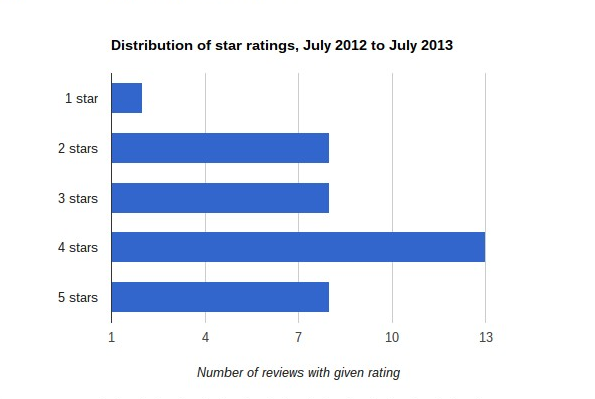Guardian Angel is an autobiography penned by Daily Mail columnist Melanie Phillips. In an interesting conceptual move away from the traditional autobiography, it is focussed on only two aspects of her life: her changing relationship with her parents, and her political shift from writing for the left-wing Guardian to the right-wing Daily Mail. As it happens, I think that’s a pretty good concept. The way in which relationships with parents change over the course of a lifetime is a deeply personal yet universal topic, while the political shift is perhaps the most interesting public aspect of Phillips’s life.
If this book was fiction, it would quickly become a literary classic. It would be a tragicomic character study worthy of Ricky Gervais, but with a subtlety in the detail revealing the flawed perspective of the narrator worthy of any classic author. It would represent a fusion of the tools and techniques of some of literature’s greatest works with a modern storyline and sensibility. I, for one, would be raving about it. And so, perhaps I should review it in those terms.
The narrator has a virtually messianic opinion of herself, which lends itself readily to the tragicomic form. The book opens with the narrator grandly describing herself in the third person:
The child lay tensely in the darkness, in a bed that was not her own. A crisis had placed her there, and impending and unimaginable horror which only one person could prevent.
The “unimaginable horror” turns out to be the death of the child’s aunt: no doubt a tragic event, but hardly “unimaginable”. This third person drama continues for some time, before the predictable, but no less comically dramatic, dénouement of the opening passage:
I was that child.
This is a very effective opening to a character study. In a few hundred words, it gives the measure of the narrator, especially her propensity for hyperbole and drama, and the third person narrative structure strikes a strong note of ego. The tendency towards dramatic hyperbole is reinforced early on. The narrator describes her childhood dislike for her paternal grandmother’s “grim slum” – which she also, somewhat inconsistently, describes as a “fine Georgian terrace”. The narrator describes the house’s oval windows, and – such was her dislike for the property –
to this day I cannot look at upright oval shapes … without my heart lurching, absurdly, into my mouth.
The monstrous ego of the character is infused throughout the text, though is perhaps most obviously reinforced by two passages: one, which is far too long to quote, in which she lists a number of perceived personal insults from other journalists (as distinct from multiple passages in which she lists criticisms of her work); and another, in which she describes the magnitude of her level of understanding of “Middle Britain”.
There are issues on which the Mail and I do not agree. I myself seemed to have an umbilical cord to Middle Britain.
Another exemplary passage is this:
Without wishing to sound boastful, I believe that on issue after issues where the evidence is now finally in, I have been proved right.
This latter passage is made more amusing by her citation of global warming as an issue “where the evidence is now finally in”; evidence which, apparently, confirms her view that man-made global warming is a oil-company perpetuated “scam which has hoodwinked millions and cost billions”. Hence, the narrator is comprehensively established as unreliable, egotistical and deeply flawed.
This characterisation groundwork is quite crucial, as the opinions described by the narrator as her own offer a crescendo of offence. Had the character not already been established as a tragicomic creation, the humour in the illogic of the offerings would be overshadowed by the level of offence they contain.
Given the concentration of the book on her own relationship with her parents, it is unsurprising that the narrator proselytises extensively about family structures. There is considerable depth about her own difficult relationship with her father, which she claims inflicted “lifelong harm”. Her father was present, but disengaged. From this, the narrator draws the illogical conclusion that divorce is harmful to children. I hardly need point out that divorce and remarriage in her case may well have equipped the narrator with the strong father-figure she claims to have lacked, where a refusal to divorce removes this possibility. In common with the opinions expressed in the rest of the book, an initial expression of dissatisfaction with the state of “modern Britain” builds to a climax of breathtaking offensiveness.
In this case, the narrator is both “perplexed” and “appalled” by the simple statement of fact that there are circumstances in which it is acceptable for a mother to leave her husband, and thus become a single parent,
and more, that it is her ‘right’ to choose such a lifestyle.
Indeed, the narrator goes on to later describe divorcees and children born out of wedlock as “deviants”, despite undermining even the technical definition of the word by quoting statistics showing that almost half of British marriages end in divorce. Yet, simultaneously, the narrator claims not to be “judging individuals”.
With similar illogic, the narrator accuses the BBC of racism for considering the needs of “Asian and African-Carribbean audiences”, and – with particular poignancy given the publisher of this book – that mainstream publishers will not publish her work because it is too factually correct.
Hopefully, I have now given you a flavour of the structure of the book, and perhaps some sense of the way in which the layers of tragedy, comedy and farce interplay in a cohesive and rather engaging way. Yet there are two other layers to this work which raise it above the level of its peers.
The first of these two additions is the peppering of one-liners which encapsulate all three elements of the main narrative. Most of these are difficult to quote in a review, as they are heavily dependent on some length of preceding material, yet I shall try to give a flavour. There is a long section in which the narrator describes the negative reaction to one of her earlier books, in which she proposed sweeping changes to the British system of education. She then extensively quotes criticism of this work. In response to other writers’ accusations that her proposals went against research evidence, she writes:
So all the teachers, educational psychologists, government inspectors … parents and pupils to whom I had spoken were not evidence, merely ‘anecdote’
To end a defensive rant against her critics with a statement of such profound bathos is, surely, comic genius.
The second exalting addition is the rich vein of unjust persecution running through the book. This juxtaposes the narrators abhorrent opinions with her own sense of persecution at the hands of others. There is one profoundly brilliant passage in which, in the context of her views on Israel, she claims
I could never relax when turning on the radio or TV, opening a newspaper or going to a dinner party, for fear of hearing some libellous accusation or other casual prejudice
The remarkable device of having this narrator complain about casual prejudice demonstrates the lack of insight possessed by the character in an exceptionally clever and highly amusing manner. This point is further emphasised by the inconsistency of opinion presented. Towards the end of her book, she claims
In my view, polarised thinking represents precisely the problem that no so bedevils politics in the UK and America. The left/right argument, which forecloses any balanced approach, simply wipes out any political space on which people can meet and discuss issues on the basis of reasoned debate rather than ideological name-calling.
It is hard to suppress a smile as the character is revealed as a brazen hypocrite, as she herself engages in something close to ideological name-calling:
The left is not on the side of truth, reason, and justice, but instead promotes ideology, malice, and oppression. Rather than fighting the abuse of power, it embodies it.
Of course, the problem with this interpretation of the book is that it is not fiction. This is a book written by one of Britain’s best-paid newspaper columnist, who credibly claims to have the ear of government. Her Gordian knot of inconsistent opinion, pseudo-mortality, and prejudice is what passes for sociopolitical commentary in one of the country’s best-selling and most influential newspapers.
There is some undeniable literary quality to this book, but only when judged beyond its own terms. Within its own terms – that is, as a non-fiction piece – it contains such odious opinions, repulsive arguments and factual distortions that I struggle to believe that it can represent the views of its well-educated author. It feels like it might be pandering of the worst kind, content written purely to falsely reinforce inaccurate prejudices.
As it seems only fair for my “star rating” to judge the book on its own terms, I’ve given it the minimum rating – one star – but hope that doesn’t detract from the qualities that this book does, albeit unintentionally, offer.





Guardian Angel is available now from amazon.co.uk in Kindle format only. Many thanks to emBooks for supplying a free copy for the purpose of this review.





